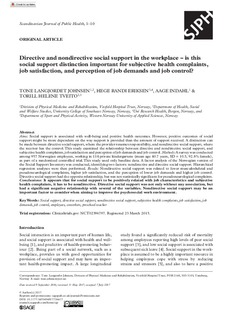Directive and nondirective social support in the workplace - is this social support distinction important for subjective health complaints, job satisfaction, and perception of job demands and job control?
Journal article, Peer reviewed
Published version
Permanent lenke
http://hdl.handle.net/11250/2592394Utgivelsesdato
2017Metadata
Vis full innførselSamlinger
Originalversjon
Johnsen, T. L., Eriksen, H. R., Indahl, A., & Tveito, T. H. (2017). Directive and nondirective social support in the workplace – is this social support distinction important for subjective health complaints, job satisfaction, and perception of job demands and job control? Scandinavian Journal of Public Health, 46(3), 358-367. 10.1177/1403494817726617Sammendrag
Aims: Social support is associated with well-being and positive health outcomes. However, positive outcomes of social support might be more dependent on the way support is provided than the amount of support received. A distinction can be made between directive social support, where the provider resumes responsibility, and nondirective social support, where the receiver has the control. This study examined the relationship between directive and nondirective social support, and subjective health complaints, job satisfaction and perception of job demands and job control. Methods: A survey was conducted among 957 Norwegian employees, working in 114 private kindergartens (mean age 40.7 years, SD = 10.5, 92.8% female), as part of a randomized controlled trial. This study used only baseline data. A factor analysis of the Norwegian version of the Social Support Inventory was conducted, identifying two factors: nondirective and directive social support. Hierarchical regression analyses were then performed. Results: Nondirective social support was related to fewer musculoskeletal and pseudoneurological complaints, higher job satisfaction, and the perception of lower job demands and higher job control. Directive social support had the opposite relationship, but was not statistically significant for pseudoneurological complaints. Conclusions: It appears that for social support to be positively related with job characteristics and subjective health complaints, it has to be nondirective. Directive social support was not only without any association, but had a significant negative relationship with several of the variables. Nondirective social support may be an important factor to consider when aiming to improve the psychosocial work environment.
Utgiver
SAGE PublicationsTidsskrift
Scandinavian Journal of Public HealthOpphavsrett
© Author(s) 2017
Med mindre annet er angitt, så er denne innførselen lisensiert som Navngivelse-Ikkekommersiell 4.0 Internasjonal
Beslektede innførsler
Viser innførsler beslektet ved tittel, forfatter og emneord.
-
Loneliness, loss and social support among cognitively intact older people with cancer, living in nursing homes - a mixed-methods study
Drageset, Jorunn; Eide, Geir Egil; Dysvik, Elin; Furnes, Bodil; Hauge, Solveig (Peer reviewed; Journal article, 2015) -
Optimizing Social Network Support to Families Living With Parental Cancer: Research Protocol for the Cancer-PEPSONE Study
Hauken, May Aasebø; Senneseth, Mette; Dyregrov, Atle; Dyregrov, Kari (Peer reviewed; Journal article; Journal article, 2015)Background: Parental cancer can have a significant impact on a family's psychosocial functioning and quality of life, whereby the children’s situation is strongly related to parental coping and capacity. Such parents ask ... -
Social support and complicated grief : a longitudinal study on bereaved parents after the Utøya terror attack in Norway
Wågø, Sunniva Skagen; Byrkjedal, Ida Kristiansen; Sinnes, Hanna Marie; Hystad, Sigurd William; Dyregrov, Kari (Journal article; Peer reviewed, 2017)On the 22nd of July 2011, Norway experienced its most extreme act of terror in recent times. The terror attacks at the Government Quarters and Utøya, claiming the lives of 77 people, left a nation in shock and numerous ...

